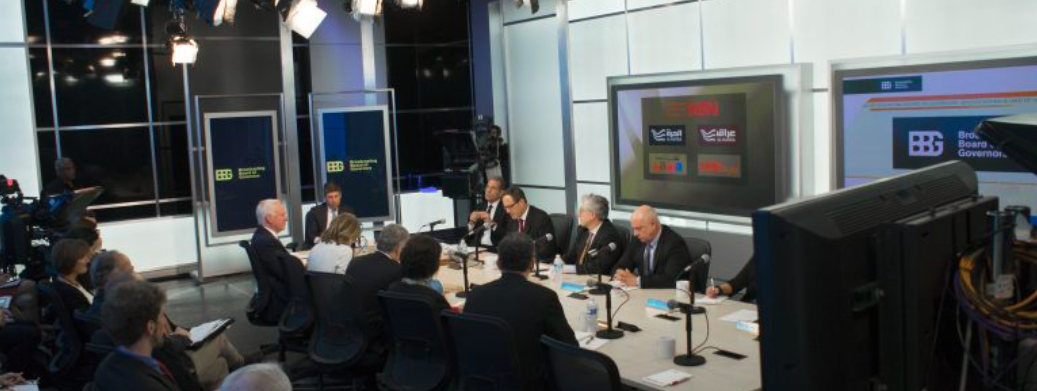BBG Watch Commentary
 The last few weeks brought more bad news for Voice of America (VOA) employees. This public institution funded by U.S. taxpayers ($224 million in FY 2017) for all practical purposes has already become a private domain of its executives, managers and a few politicized VOA reporters pushing their own personal or political agenda. Instead of strengthening institutional protections against such abuses, at least some members of Congress want to privatize the Voice of America with the so-called Thornberry Amendment. There are at the same time more comprehensive and better but still not perfect legislative proposals, such as the bipartisan bill H.R. 2323, that would protect VOA’s public status within the U.S. government and prevent it from being turned into a private/state media organization run by incompetent executives at taxpayers’ expense with even less accountability than it has now. Among other reforms, the more responsible H.R. 2323 bill proposes doing away with the dysfunctional Broadcasting Board of Governors (BBG) and the agency under the same name, which former Secretary of State and herself BBG member Hillary Clinton described in 2013 as being “practically defunct.” Since then, the agency has become much worse and no reforms have been passed in Congress.
The last few weeks brought more bad news for Voice of America (VOA) employees. This public institution funded by U.S. taxpayers ($224 million in FY 2017) for all practical purposes has already become a private domain of its executives, managers and a few politicized VOA reporters pushing their own personal or political agenda. Instead of strengthening institutional protections against such abuses, at least some members of Congress want to privatize the Voice of America with the so-called Thornberry Amendment. There are at the same time more comprehensive and better but still not perfect legislative proposals, such as the bipartisan bill H.R. 2323, that would protect VOA’s public status within the U.S. government and prevent it from being turned into a private/state media organization run by incompetent executives at taxpayers’ expense with even less accountability than it has now. Among other reforms, the more responsible H.R. 2323 bill proposes doing away with the dysfunctional Broadcasting Board of Governors (BBG) and the agency under the same name, which former Secretary of State and herself BBG member Hillary Clinton described in 2013 as being “practically defunct.” Since then, the agency has become much worse and no reforms have been passed in Congress.
As the Congress and the Administration to nothing to reform the Broadcasting Board of Governors, current BBG Chairman Jeff Shell was exposed trying to do private business in President Putin’s Russia for the company he works while also leading the federal agency in charge of supporting freedom and democracy and wanting at the same time to represent the United States on a visit Russia.
Instead of being advised to avoid such travel altogether, not to travel to Russia using his regular passport instead of his official one and, above all, to avoid any appearance of conflict of interest, Mr. Shell was advised to proceed by his own pick for BBG CEO, Mr. John Lansing who has no prior experience in U.S. government service, U.S. international media, public diplomacy or foreign policy. The Russian government detained and expelled Mr. Shell, to which Mr. Lansing replied with a statement rightly condemning the rude expulsion but which omitted critical details and material facts, such as Mr. Shell’s apparent plan to mix private and U.S. government business in Russia or the fact that while Mr. Shell was expelled by the Putin government, Mr. Lansing and BBG’s International Broadcasting Bureau (IBB) deputy director Jeff Trimble were allowed to enter Russia. A Voice of America report on the expulsion of Mr. Shell was equally short on detail, misleading and deceptive. Conflict of interest issues were completely ignored. Voice of America employees have also seen new VOA director Amanda Bennett praising VOA programs which they believe violate the VOA Charter because of their one-sided presentation of issues. At the same time, Ms. Bennett issued statements defending the VOA Charter.
Both Donald Trump’s and Bernie Sanders’ supporters have accused the Voice of America or exposing American voters to biased, one-sided reporting about their favored candidates. To her credit, Ms. Bennett ordered anti-bias training in the wake of criticism, but soon thereafter VOA employees were exposed to even more confusion and chaos. Finally, in the middle of the Republican convention in Cleveland, OH, a senior BBG executive told VOA journalists that “in order to avoid any bandwidth problems,” they must completely discontinue non-business use of VOA’s digital infrastructure. As some current and former VOA employees observed, IBB executives should have anticipated and solved this problem long ago, well before this year’s U.S. political party conventions. Such a memo would have never been written by a manager at a well run media organization. VOA’s digital processing and storage platforms have not been updated in years while the BBG bureaucracy continued their hiring frenzy. The bureaucracy has been creating new administrative and managerial positions, reducing programs and replacing permanent employees with contractors. Exploited contract employees have now filed a $400 million class action lawsuit in a federal court against the BBG. It is a depressing picture and it is getting worse day by day. VOA was probably the only one among major news media outlets anywhere in the world with no Facebook activity in English on a major U.S. news story during the critical hours of the shootings crisis in Dallas, TX.
Even before the latest crises came to light, the following editorial, published by the American Federation of Government Employees, AFGE Local 1812, which represents BBG’s federal workforce, described the agency’s dismal situation which continues under the new leadership.
###

Moving Forward, VOA Haunted by Its Past
By American Federation of Government Employees, AFGE Local 1812
How many management teams has VOA had over the years? It’s hard to keep count. But each comes in with bright ideas and new ways of reinventing the wheel their predecessors tried to reinvent – and failed, leaving the agency worse for wear than when they inherited it.
Here’s the thing: You get a brand new leadership team, forward-looking, with experience from the world outside VOA. And then what happens? Those that inform the new team are the managers whose failed experiments have put
VOA at the bleak crossroads where it stands today.
Today’s VOA is uncertain. It wants to be free, but cannot proceed without a Congressional nod. It wants to be digital but is tangled up in the red tape of its past. It wants to be a digital presence but is held back by so many barriers that it is at a standstill.
VOA has so much talent and potential it is dizzying to think how undersold and misappropriated these talents are. It is not that they are not appreciated. It is that they are taxed to exhaustion. There are never enough bodies to do the job; meaning those that are tackling all that needs to be done are burned out rather quickly.
This is not to say they are overworked, but that there are countless job positions that have been abandoned or left unfilled over the years that the staff cannot keep up with adequately producing the product.
Over the past decade, it was management positions that got filled, often with higher grades. VOA carves into the underbelly almost to the bone; and piles on the fat at the top. That’s the way it has been for many years now. In this situation, people have given up hope on change because change just doesn’t happen. It just recycles past failures and creates new ones. It is as if VOA is cursed with bad managers and bad decisions that trigger a domino effect, leading to even more bad decisions.
It is important to note that an ill-advised appointment or a bad decision in an agency of this size and with the kind of mission it has invariably makes the job of any new management team that much more difficult.
On top of this, failed managers don’t get booted out; they get promoted. And if they’re lucky, then a few years down the road, they will get reassigned to wreak havoc on a new division. And the cycle goes on.
VOA employees are proud of their work; and they want to do a good job even without badly-needed resources because they love their jobs. But there is a huge morale problem, vividly documented in the annual OPM Human Capital Survey, which is thick in the air in many parts of the agency – and is due, in large part, to bad management decisions.
Perhaps there is hope that the new management team might still save VOA from itself. But how well are they informed? And by whom?
In his Essay on Man, poet Alexander Pope coined the proverb: “Hope springs eternal” which some have interpreted as meaning that people will keep on hoping, no matter what the odds.
If, however, our modus operandi persists in reflecting the words of Albert Einstein: Insanity: doing the same thing over and over again and expecting different results, we are certainly doomed.
